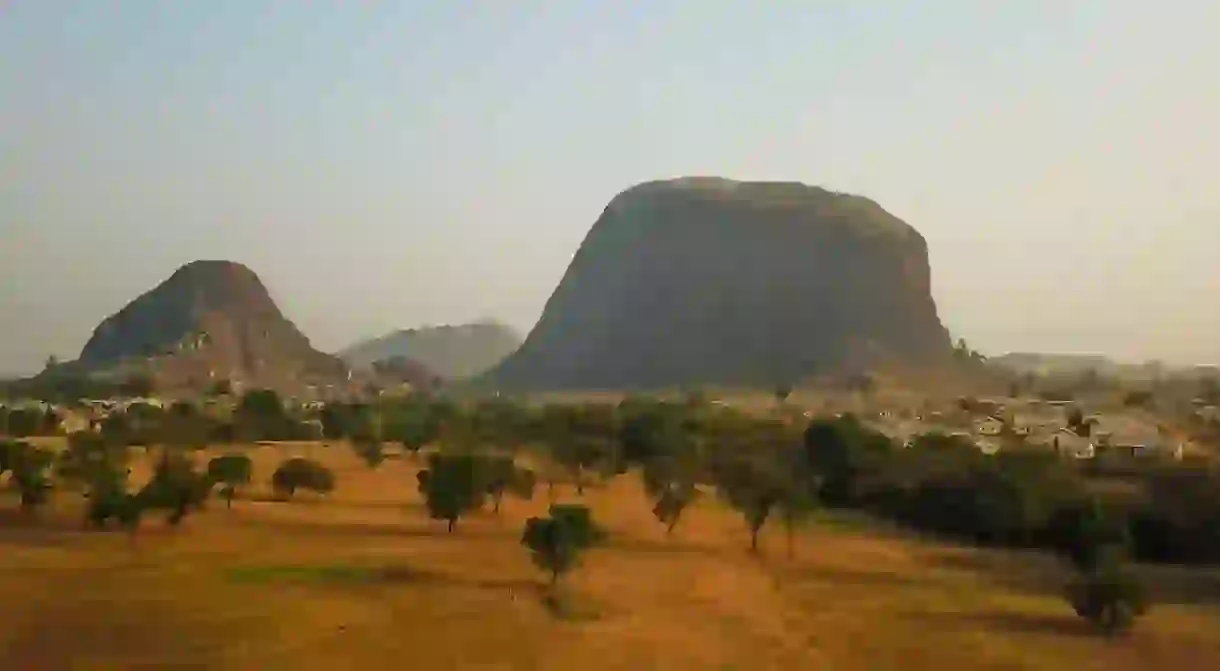11 Top Things to See and Do in Abuja

Abuja is the capital city of Nigeria. Built in the 80s, it is one of the best planned and laid out cities in Nigeria. Originally inhabited by the Gbagyi, Bassa Gade, Ganagana, and Koro peoples, it presently serves as a neutral ground for all the different cultures in Nigeria. Because of its unique positioning, it manages to combine the rustic with the modern. One of the easiest cities to navigate, Abuja’s roads and transportation are top notch and relatively inexpensive.
Visit National Monuments
Abuja has no shortage of fantastic architecture, some of which include the Abuja National Mosque, which was built in 1984 by Lodigiani Nigeria and designed by AIM Consultants. The mosque is an explorer’s delight and is open to the public except during prayer times. The National Christian Centre, with its neo-gothic design, is another architectural monument that will delight the tourist. Others include the National Library, the Ministry of Defence (built in the shape of a ship), ECOWAS Secretariat, and so much more.
Catch a Movie…or Two
There are several cinemas scattered around the city that offers blockbusters and the inimitable Nigerian movies. Some of them include the Silverbird Cinema located at Tafawa Balewa Way in the Central Business District, the French Cultural Centre, Libre Ville Street, Off Aminu kano Crescent, Wuse, and Cyreenee International, Omega Center, and Aminu Kano Crescent, also at Wuse.
Don’t Go Chasing Waterfalls
Although you can visit the Jabi Lake, which is a calming and beautiful body of water, it is skirted by the Jabi Park, where you can go horseback riding, and a mall where you can easily do your shopping. Jabi lake also offers boat rides, different kinds of water sports, and beautiful shots, especially in the evenings. And if you must chase waterfalls, than a visit to Gurara Falls should be on your list. Not only does it have a lot of myths surrounding it, the falls is a favorite of bird watchers (for the myriad species of birds that makes the surroundings their home) and great for picnicking. The Usman Dam and Pedam Lake are also open for exploration, picnicking, and bird-watching.
Relax at a Park
The Millenium Park, designed by Manfredi Nicoletti, is one of the biggest and most beautifully laid out in the city. Others include the Julius Berger Waterfront Park, Eden Parks and Garden, Area 1 Recreational Garden, and many more. You can exercise, ride a bicycle, play football, or simply take in the sun and people watch at these parks.
Do Go Rock Climbing
Climb the Aso Rock, which is located just behind the presidential villa and gives a magnificent view of the surrounding countryside (the presidential is named after the rock). You can also explore the mystical Zuma Rock, a 725 meter (2,379 feet) monolith considered the home for the spirits of the dead by the Koro peoples (original occupiers of the rock).
Go Shopping at an Open Market
The Utako Market is the most lively and crowded; it is also considered a farmers market and you can get fresh fruits and vegetables cheaply from the market. Garki Model Market, on the other hand, is the least crowded because it is well laid out and more tightly controlled. There is also the Wuse Market, considered the most popular, and a little larger than Wuse Market is the Garki International Market, where you can buy clothes and confectioneries. Kado Fish Market is the place to go for your fresh water food and yummy fruits.
Buy or Window Shop Art
As vast as Nigeria is, so are the multitudes of arts that can be seen and bought, and aside from the arts that can be bought in market places, there are several art galleries with well-curated sculptures, installations, and paintings. Some galleries that have made their home in Abuja include Nike Art Gallery, Thought Pyramid Art Centre, and Omega Gallery. Bwari Pottery Village, like its name, implies that it is dedicated to the art of pottery making. You can watch potters at work, explore the different sections, and buy pitchers, casserole dishes, or teapots. The Abuja Art and Craft Village are also a must-see.
Or Step Into the Cool Interior of a Shopping Mall
There are many shopping malls in Abuja where you don’t have to subject yourself to crowds or temperamental shop owners. Some of the most popular are the Ceddi Plaza, Jabi Lake Mall, Park ‘n’ Shop, Asokoro Shopping Mall, and many more.
Eat Street Food
The point of an adventure is getting to experience new cultures, and experiencing the cuisine of these cultures shouldn’t be missed. Because of its nature as a capital city, Abuja is a hodgepodge of tastes and olfactory delights. Eating suya, in its many forms (chicken, beef, ram, goat, turkey) and textures (kilishi/grilled) is a must. There’s also masa, milk curd/cheese (wara), akara, and different dishes from across Nigeria that are sold in different cafeterias around the city.
Step It Up at a Five-Star Restaurant
You can have breakfast, lunch, or dinner out with friends or lovers at places like the Blu Cabana, Jevinik (specializing in local dishes), 355 Steakhouse, and Lounge, Nkoyo (specializing in local dishes), Wakkis (Indian), Zuma (steakhouse), and so much more.
Wild Out
Another feature of Abuja that excites visitors is his nightlife, with a myriad of lounges, peppersoup joints, and nightclubs, so having a good time in the city is not a problem. Skybar Rooftop Lounge has one of the best views and ambiances in the city. The Mashoria Arena has great cocktails and music, as does the Carribean Lounge and Nightclub.
Africa
Architectural Landmark, Historical Landmark

Come face-to-face with some of the planet’s most incredible wildlife on a safari, or explore the miles and miles of winding alleyways in North Africa’s souks and bazaars. Our packages offer unforgettable vacations throughout this incredible and varied continent.













